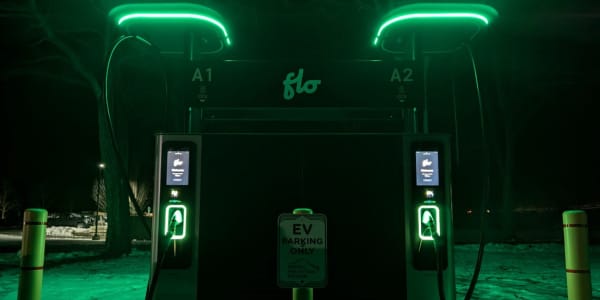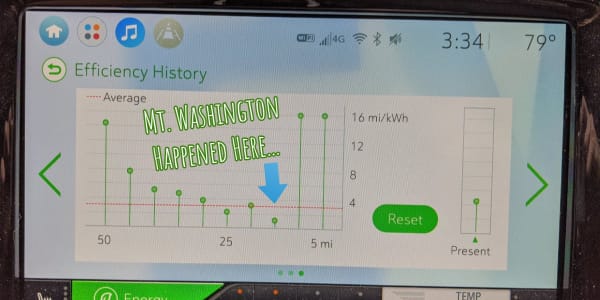Good day, fellow gamifier of efficiency graphs* ♻️📊
*see the end of this newsletter for my personal favorite evNerdGraph
Utilization was the hot topic this week, as EVgo and Electrify America released reports on 2024 charging activity. TL;DR: sessions are only heading in one direction 🚀and we need a flurry of EVI construction to keep pace with growing utilization… but how much of that surging 2024 demand was artificial?
While we’re on the subject, if you receive this as a forward — or somewhere other than your inbox — use the big green button below to demand your own copy…
All set? Okay, here’s all the fun from North American EV infrastructure this week ⤵️
Supercharger Arson Only Demonstrates Tesla’s Industry-Leading Infrastructure
News - A fire at the Tesla Supercharger in Littleton, MA on Monday 3rd March, 2025, is being investigated as an intentional act of arson by local authorities.
Numbers - 7 of 12 dispensers at the site caught fire, taking the Supercharger out of commission for 48 hours. Power cabinets appeared to be unaffected.

Nuance - If the attack was intended to take Tesla down a peg or two, it only elevated the fact that the Supercharger team’s responsiveness is second to none. We visited the site on Tuesday 4th March and spoke to drivers who experienced minor inconvenience, but the next Supercharger is a mere 15 miles from Littleton. The incident only served to underscore Tesla’s unrivaled charger coverage and industry-leading maintenance.
Next Up - Although the incident was quickly flipped on its head, questions arise about security at Tesla Superchargers, and EV charging sites in general. The Littleton Supercharger is in a relatively remote lot with minimal traffic, making it an easier location to target than others. As EV adoption increases and sentiment shifts, location security must be high on the list of priorities for network planning teams.
Charging Vendor Spotlight: EVgo
News - EVgo released its results for 2024 and lifted the lid on some illuminating stats in the process. This makes them ideal fodder for this week’s vendor spotlight.
Numbers - 1,100+ stations with 4,080 stalls across 40 states at the end of 2024. The former metro area focus of EVgo owned/operated stations isbolstered by 100+ new stations under the eXtend program with Pilot-Flying J, primarily along travel routes.

Nuance - EVgo’s blend of owned/operated stations in areas with high EV adoption and maintenance of partner stations, under the EVgo eXtend program, shows a path to profitability for pure-play charging vendors. In cities and along busy exurban travel corridors, utilization is key to a profitable station. Along travel routes in more rural/remote areas, arrangements that shift CapEx to partners with a broader business model (such as Pilot-Flying J under eXtend) provide a way to deploy a nationwide network that attracts EV drivers and potentially drives recurring revenue through membership plans.
Next Up - A loan of $1.05 billion from the US Dept. of Energy appears secure despite recent funding freezes. EVgo plans to use this to expand fast charging in communities across 10 states. Further partnerships under the eXtend program, such as one with grocery store Meijer, along with OEM collaborations with General Motors and Toyota, all represent pillars of the charging business that EVgo projects can turn a profit in 2025.
AC/DC: itselectric Debuts in Boston
News: NYC-based destination charging startup itselectric cut the ribbon on the first of many charging posts to hit the streets of metro Boston, MA.
Numbers: The debut location in Roslindale is the first of an initial 250 curbside chargers that the Wu administration aims to install citywide. That total is split across multiple vendors to test different solutions and, potentially, deploy the most successful at scale.

Ribbon cutting in Roslindale, MA | Credit: itselectric
Nuance: The itselectric charging post is a “bring your own cable” (BYOC) solution, not unlike those commonly deployed in European cities. Its minimalism and behind-the-meter setup are attractive to city planners and property owners alike, due to the unobtrusive nature of the post and the fact that buildings can choose to make money on the electricity delivered. Hear more about it from co-founder Nathan King on this podcast.
Next Up: In Boston, Jamiaca Plain is the next neighborhood tapped for an itselectric installation. Other vendors selected, including Flo and Greenspot EV, will deploy cord-included systems around Boston this year. itselectric will also progress pilots of its solution in New York City, San Francisco, and several other metro areas this year.

On the Road: This Week in DCFC
News - The Alternative Fuels Data Center (AFDC) listings appear to be picking up pace again, with previously absent players like Tesla and ZEF Energy back on the board. Thanks, as always, to Walter Schulze at The Network Architect Channel for keeping tabs on this. His latest update video rounds out this section.
Numbers - 84 fast charging stations added across the United States and Canada, according to AFDC listings this week. The North American station count. Both the US and Canada posted significantly better numbers than last week, with a wider coverage of provinces north of the border, from Quebec to Saskatchewan.
Notable Locations Added to AFDC:
⚡ Mercedes-Benz High Power Charging led the openings this week, with 20 new 400kW stalls across two sites in Texas. New Braunfels and Waller, TX both get five new Alpitronic HYC400 dispensers serving ten stalls at each site, both of which are hosted by Buc-ee’s
🟦 FLO Charging continued the deployment of its latest charging platform, Flo Ultra, with four-stall deployments in Granby, Quebec, and Regina, Saskatchewan.

FLO Ultra station at night
📍 Tesla added another pin to the NEVI map this week, with the new Supercharger in Frankfort, KY starting to charge Tesla vehicles. The site should be available for non-Tesla models this week and marks Kentucky’s third federally funded station, with two others at Circle K in Richmond and Berea, KY.
🔵 Having previously featured the company as an outstanding example of L2 charging installations across New York state, this week ChargeSmart EV gets on our radar for a DCFC deployment. The eight-stall station in New Jersey adds AUTEL units capable of up to 240kW for travelers on I-95 and locals near East Brunswick, NJ.

ChargeSmart’s latest DCFC deployment in New Jersey | Credit: ChargeSmart EV
🔶 After unwanted attention for price hikes a few weeks ago, the Rivian Adventure Network got back to building this week. Two new RAN stations activated in Astoria, OR and Columbus, TX bring the number of locations accessible to non-Rivian models to 14.
🔷 The unique dispensers of Kempower make a welcome appearance at a ZEF Energy site in East Ridge, TN, with a neat installation featuring pull-through stalls and up to 240 kW of power delivery.
🌵 EV Range lives up to their name with a new station energized in remote California. Four 180kW dispensers in Portola, CA represent the only fast charging option on Highway 70 for more than 50 miles in any direction. Read more on this important location directly from the City of Portola here.
AFDC summaries from The Network Architect Channel on YouTube resumed this week. Follow DCFC updates like this one for a wider look at how and where the leading charging vendors are expanding.

Pricing
Some stability on pricing this week, after several editions covering pricing experiments and slight shifts in our averages, both nationwide and across NEVI sites.
That said, prices at Francis Energy stations do continue to creep up ever so slightly, with more Ohio sites passing the $0.60 per kWh mark in line with the network’s first Pennsylvania locations, which started at $0.62 per kWh.
Despite those increases at Francis locations, average pricing at NEVI sites remained at $0.51 per kWh.
Although it was last week’s news, Mercedes-Benz HPC did continue to roll out “Welcome Pricing” of net $0.40 per kWh at new sites in Texas. MB-HPC also adjusted pricing at select existing sites, including Leeds and Robertsdale in Alabama.
The topic of pricing and demand also arises in the latest numbers from Electrify America, who reported a 65% increase in energy delivered last year compared to 2023.
But how much of that energy was given away for free and, possibly worse, represents “artificial” demand?

The numbers above represent our use of the Electrify America network since 2022, on a plan with three years of complimentary charges for our Hyundai IONIQ 5. The plan coincidentally expires this week, making these our final numbers from the promotion.
The 31.2% labeled artificial demand is derived from sessions at locations close to home, which otherwise would have been handled by L2 charging. Opportunistic use of these locations, incentivized by this kind of DCFC promotion widely used by Electrify America, emphasizes how some non-Tesla charging activity in the United States is currently distorted. This also calls utilization metrics — and, by extension, potential profitability — into question.
As we move into a period of rapid growth for EV adoption, true demand for DCFC is a critical consideration for vendors deciding where and when to deploy expensive fast charging stations.
Pricing stations in a way that drives increased utilization is undeniably a part of this strategy. However, decisions informed by artificial demand generated over the past two or three years could prove costly, if EV drivers in high-utilization areas can fall back on lower-cost destination charging when their promotional plans expire.
Policy:
News - The Government Accountability Office (GAO) announced this week that the previous administration's approval of California's plan to end the sale of combustion vehicles by 2035 is not subject to review/repeal by Congress.
Numbers - State policy requires 35% of 2026 model year sales to be zero-emission vehicles (ZEV). This figure rises to 68% by 2030, then applies to all new vehicle sales by the final deadline in 2035.

Nuance - The EPA granted waivers to California allowing it to require stricter emission standards and stoke greater ZEV adoption. With a change in administration, the move has been under threat. Aspects of California’s Clean Air Act rules have been adopted by 11 other states, from New York to Oregon. For this reason, ZEV initiatives across the US could hinge on whether or not the federal government is permitted to roll back such policies.
Next Up - Republicans at the Senate Environment and Public Works must now consider their next move to deliver on the directive to rescind California’s waivers. Senate Democrats, meanwhile, will continue to support the GAO ruling as "consistent with prior decisions and helpful in protecting California's citizens."
Fleet Focus: EV Realty to Scale HDEV Charging with Gage Zero
News - Electric Fleet-focused property developer EV Realty acquired a strategic portfolio of assets from Gage Zero.
Numbers - Seven Gage Zero charging hub projects across California, plus assets in Texas and Illinois, represent a significant expansion of EV Realty’s portfolio. The assets add to EV Realty’s planned truck charging hubs in Torrance, Livermore, and San Bernadino.

Nuance - The acquisition is the latest in a string of strategic partnerships by EV Realty, following collaborations with GreenPoint Partners and Ava Community Energy over the past 18 months. Sites across California are being rapidly snapped up by fleet infrastructure firms eager to build out HDEV charging before the state’s aggressive climate deadlines for zero-emissions transportation start to bite.
Next Up - Assets acquired will “enable medium-term expansion into additional key markets where zero-emission freight movement is gaining traction,” according to EV Realty. Key members of Gage Zero’s team will join the firm as part of the acquisition.
For Your Listening Pleasure
In every edition, we recommend one of the best listens on electrification, energy, or something similarly EV-related. This week, we return to the ever-insightful Volts podcast, which offers a different take on the fate of federal EV tax credits in the United States:
Albert Gore of the Zero Emission Transportation Association (ZETA) steadily unpacks the history of incentives for electric vehicles at the federal level, including why the current version focus so firmly on domestic sourcing and create jobs across North America. Unlike the prevailing industry wisdom that removal of the Clean Vehicle Credit is inevitable, he offers a more nuanced take on why the incentives could survive in some form.
💯 That’s us all charged up on EVI developments for another week.
If you found this digest valuable, pass it on to a friend, prospective EV owner, or a colleague in the industry.
And remember, your average kW delivery at a DC fast charger eats peak power for breakfast 📉🧐
Cheers,
Steve / Plug & Play EV
p.s. 📊 As promised, here’s how a Bolt EV handles Mt. Washington… 👇

Essential EV Follow - Elena Ciccotelli

The EVs for Everyone podcast is a vibrant splash of color and personality in the otherwise straight-laced world of LinkedIn. Much of that comes down to host Elena Ciccotelli’s ability to bring automotive topics to life.
Where Elena’s quickfire shorts and entertaining analogies lure you in, deeper interviews and insights from experienced auto execs deftly summarize the intersection of electrification and personal transportation.
